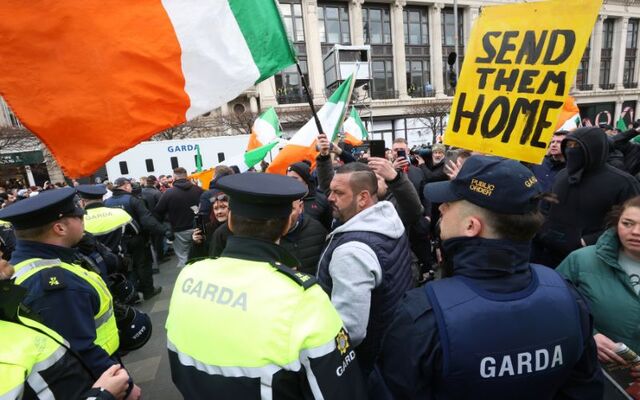The Irish Government and the gardaí should look to UK authorities’ decisive and swift response to recent race riots that erupted in British cities to combat the rising threat of far-right violence in Ireland, a senior analyst of right-wing extremism has said.
Aoife Gallagher of the Institute of Strategic Dialogue also said growing disinformation is inciting more violent attacks on migrants.
Speaking to the Irish Mail on Sunday, Ms. Gallagher said the "main goal" of the far right in Ireland is to "instill fear" in the immigrant community, which they do by spreading disinformation and misinformation online.
Examples of these tactics were in evidence this week as agitators falsely and without any evidence linked a shocking incident involving a baby caught up in a Dublin car hijacking incident to immigration.
A false comment on Facebook with the hashtag #closeourborders was widely shared; first by a well-known far-right account, then going viral and being viewed over 100,000 times.
Despite the original message being false, without any evidence or proof to back up the claims, commenters were quick to jump on the anti-immigration bandwagon. One said: "There’s no link to crime and migrants I was told…"
Another post accompanied by angry emojis claimed: "Migrants kidnap a five-month-old child" while another account tagged Taoiseach Simon Harris, Justice Minister Helen McEntee, and President Michael D Higgins, asking: "When are you going to stop unvetted criminals [getting] into the country?"
But the use of blatant lies or innuendo to spread fear and hate is nothing new, and migrants are regularly falsely linked to crimes across Irish social media.
According to Ms. Gallagher, this disturbing trend became noticeable around the start of last year. She recalled "one incident in particular with claims of a sexual assault" by four migrant men.
Ms. Gallagher told the Mail on Sunday: "It was a very specific claim and that triggered protests at the time.
"It is a trend we have continued to see more and more of over the last number of years. They [far-right] take any piece of information they can get and weave it into their agenda, and it doesn’t matter if it’s true or false. That’s not important; what is important is they are able to capitalise on it in some way."
She said the use of disinformation to spread fear is a "really, really serious issue" that leads to "vigilante mob violence."
Usually, false or unsubstantiated posts refer to alleged crimes on women and children. Some use blatant lies; others rely on innuendo.
One of Ireland’s most-followed far-right provocateurs posted a headline saying: "Irish woman sexually assaulted in Donegal last night," with the hashtag #irelandisfull’ and a link to a news article.
No details on the suspect were relayed in the article, but the post was enough to fuel commenters’ anti-immigrant agenda.
The same account posted a photo of two men in a work van with the message: "Foreign men watching kids in Dublin. With over 300 kids missing in Ireland and gardaí admitting foreign gangs are selling kids into sex slavery, take no chances."
In recent weeks, gardaí have been forced to intervene to correct the record on some posts because of how lies have spread online.
Late last month, gardaí issued a statement after a Facebook post claimed "two foreign men grabbed a child" in north Dublin. The post further claimed that residents had made this known to the gardaí, whom they accused of failing to respond to the incident.
In clarification, the statement from gardaí said: "No incident of attempted child abduction or similar activity has been reported to An Garda Síochána nor has An Garda Síochána any information to substantiate such claims.
"An Garda Síochána is very conscious of the volume of misinformation, disinformation and fake news on this incident and in general, particularly on social media and messaging platforms."
Also last month, gardaí were forced to issue a separate statement after far-right activists tried to blame asylum seekers for the sudden death of a man in his 30s following a medical episode.
The man became seriously ill near Saggart Luas Terminal in southwest Dublin on Wednesday evening, August 7. He was taken from the scene to Tallaght Hospital, where he was later pronounced deceased.
Several online accounts on TikTok and X posted videos of gardaí at the scene at Fortunestown Lane with false claims that asylum seekers were involved in the man’s death.
Claims were categorically rejected by gardaí, who said they were aware of posts and comments online with misinformation and disinformation linking the man’s sudden death to immigration and international protection. "This speculation and commentary is completely false," their statement said.
Earlier this month, gardaí were also forced to publicly correct disinformation spread by far-right social media accounts about an incident at a school in Dublin.
They urged people to verify information after several far-right figures falsely claimed a knife-wielding migrant was involved, and went on to confirm that all involved were school students and Irish nationals.
Ms. Gallagher said it is "helpful" gardaí are trying to counter the false information but stressed "more communication" is needed.
She said it is "scary" to think of where the country could be headed in terms of the growing far-right threat. And she urged the authorities to look at the UK government’s response to the race riots there.
Ms. Gallagher was speaking as a new report released by the Institute of Strategic Dialogue warned social media companies are fuelling xenophobic and racist abuse targeting migrants by "failing to take action."
The think tank, which focuses on countering extremism, analysed 61 incidents in Ireland over three months up to mid-August. The vast majority targeted migrants and people seeking asylum, while others related to Irish people of colour.
The institute noted those engaging in racist abuse online do so with "perceived impunity," adding: "They often post under their real name, apparently with little fear that they will face prosecution."
In response to queries from the Mail on Sunday, media regulator Coimisiún na Meán said disinformation "is a significant societal challenge… which requires a cross-societal response."
A spokesman for the regulator said: ‘Coimisiún na Meán, through our Online Safety Framework, has a number of levers with which we can address mis- and disinformation – through our promotion of media literacy, regulation of broadcasters and online platforms, and support for high-quality journalism.
"Under the Digital Services Act (DSA), for VLOPs (very large online platforms) with over 45 million monthly users, the European Commission is the lead authority for how these platforms mitigate risks arising from how their services are used, including the harmful impact of disinformation and misinformation. An Coimisiún works with the European Commission when it comes to large platforms based in Ireland."
*This article was originally published on Extra.ie.




Comments